Share on social media
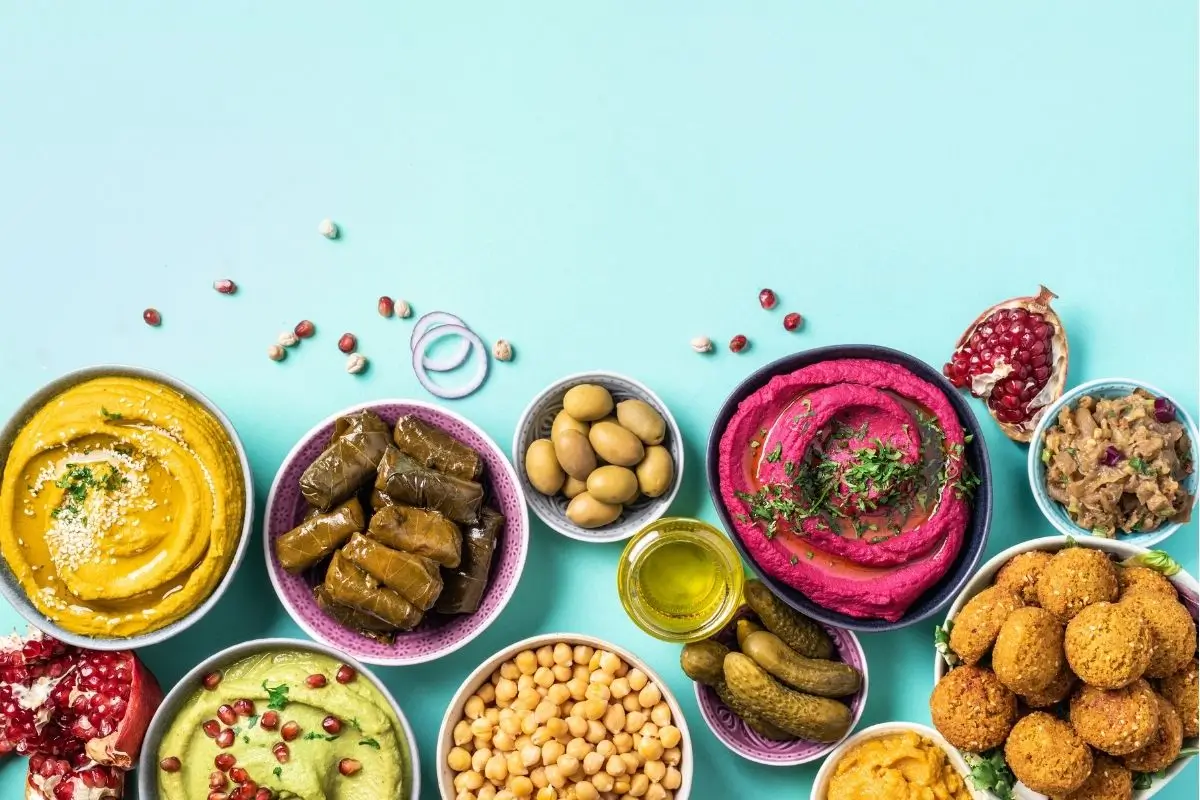
Healthy Mediterranean food in Houston beckons from the heart of the city, where Aladdin Mediterranean cuisine invites you on a culinary journey of healthy fats and vibrant flavors. Imagine walking into this beloved eatery and discovering dishes that each tell a story— from crisp salads to aromatic kebabs and comforting stews, every plate is not only delicious but brimming with nutrients.
Join us on this flavorful adventure through some of Aladdin’s most beloved dishes, and discover how this local eatery doubles as a healthy restaurant in Houston, offering a diverse array of nutritious options. In a city full of dining options, it’s a delight to find healthy food in Houston that comes with a side of rich culture and history.
At the center of every Mediterranean meal—whether in a bustling Houston eatery or a sunlit home along the Mediterranean Sea—lies a philosophy that celebrates both flavor and well-being.
The Mediterranean diet is more than just a collection of delicious foods; it’s a time-honored eating pattern known as the Mediterranean-style diet that has captivated nutritionists and food lovers alike for its remarkable health benefits and vibrant, satisfying dishes. Eating patterns of the Mediterranean Diet were modeled after the traditional habits of Southern Italy, Greece, and Crete in the 20th century, reflecting a rich culinary heritage.
The foundation of the Mediterranean diet is built on an abundance of fruits, vegetables, and plant-based foods. Think of tables overflowing with colorful vegetables, such as leafy greens, ripe tomatoes, and bell peppers, alongside bowls of fresh fruits—berries, citrus, and apples—that add natural sweetness and a burst of antioxidants.
Whole grains, such as brown rice, whole-grain bread, and hearty whole-grain pasta, are staples that provide sustained energy and essential fiber for gut health and weight management. Legumes, such as lentils and chickpeas, offer a plant-based source of protein, helping you feel complete and balanced.
One of the most celebrated aspects of this healthy eating pattern is its emphasis on healthy fats, particularly extra-virgin olive oil. Olive oil is the primary fat source in the traditional Mediterranean diet, lending its rich flavor and heart-protective properties to everything from salads to stews.
These unsaturated fats, found in olive oil, avocados, nuts, and fatty fish like salmon and sardines, support heart health, help reduce inflammation, and may even play a role in brain health. Fish and seafood are primary sources of protein in the Mediterranean Diet, with an emphasis on fatty fish rich in omega-3 fatty acids.
In contrast, the Mediterranean diet encourages limiting saturated fats—such as those found in red meat, full-fat dairy, and animal fats—and instead choosing lean proteins like poultry, fresh fish, and plant-based options.
Equally important is what the Mediterranean-style diet leaves out. Highly processed foods, refined carbohydrates (like white bread and sugary cereals), processed snacks, and sugary beverages are kept to a minimum. Fatty or processed meats, such as sausages and hot dogs, are rare guests at the table, replaced by more fish, legumes, and low-fat cheese or Greek yogurt.
Portion control is crucial for avoiding overeating, even with healthy foods. This mindful approach to food choices helps lower the risk of heart disease, high blood pressure, and other chronic diseases, while supporting healthy blood sugar and cholesterol levels.
But the Mediterranean lifestyle is about more than just what’s on your plate. It’s about how you eat—sharing meals with family and friends, savoring each bite, and being present at the table as part of your eating plan. This social, mindful approach to eating not only enhances enjoyment but also encourages better portion control and a deeper connection to the food you eat.
The health benefits of the Mediterranean diet are well-documented: a reduced risk of cardiovascular disease, improved weight management, better gut health, and even a lower risk of Alzheimer’s disease and certain cancers. By focusing on all the food groups—fruits and vegetables, whole grains, lean proteins, healthy fats, and low-fat dairy—while limiting saturated fat and highly processed foods, this eating plan offers a delicious path to lifelong wellness. Seafood should be included in at least two servings per week to maintain omega-3 intake, further enhancing the diet’s heart-protective benefits.
Whether you’re enjoying a plate of roasted cauliflower, a bowl of lentil salad, or a drizzle of extra virgin olive oil over whole grain bread, you’re participating in a tradition that nourishes both body and soul. Embracing the mediterranean diet means choosing foods that are as good for your heart as they are for your taste buds.—and making every meal a celebration of health, flavor, and connection.
Our journey begins with a bowl of Tabouli salad placed on the table, radiating a verdant freshness. One bite of this classic Lebanese tabbouleh and you’re greeted by a medley of finely chopped parsley, mint, ripe tomatoes, and delicate bulgur wheat, all lightly dressed in lemon and olive oil. The flavors are bright and herbaceous – it’s as if you can taste the sunshine and soil of the Mediterranean in each forkful.
But Tabouli isn’t just about great taste; it’s revered for its nutritional profile and health benefits. Parsley and mint are more than garnishes here – they’re the heroes, brimming with vitamin K, vitamin C, and antioxidants that support immunity and bone health. Tomatoes contain lycopene, a potent antioxidant that helps combat inflammation.
Meanwhile, the bulgur wheat (a whole grain cracked wheat) provides fiber and B vitamins, releasing energy slowly for steady fuel. The combination of fresh herbs, veggies, and whole grains creates a trio of nutrients that uplift both body and mind – antioxidants to protect cells, vitamins to fuel metabolism, and fiber for sustained energy.
No wonder tabbouleh has been a staple in Middle Eastern diets for centuries; it’s a dish where flavor and wellness unite. As you savor this refreshing salad at the start of your meal, you’re not just indulging in a Houston foodie favorite – you’re nourishing yourself with a genuine Mediterranean superfood. Bowls of fresh fruits—berries, citrus, and apples—are also standard on Mediterranean tables. Fresh berries, in particular, are a popular choice for a Mediterranean breakfast or snack, offering antioxidants and a naturally sweet taste.
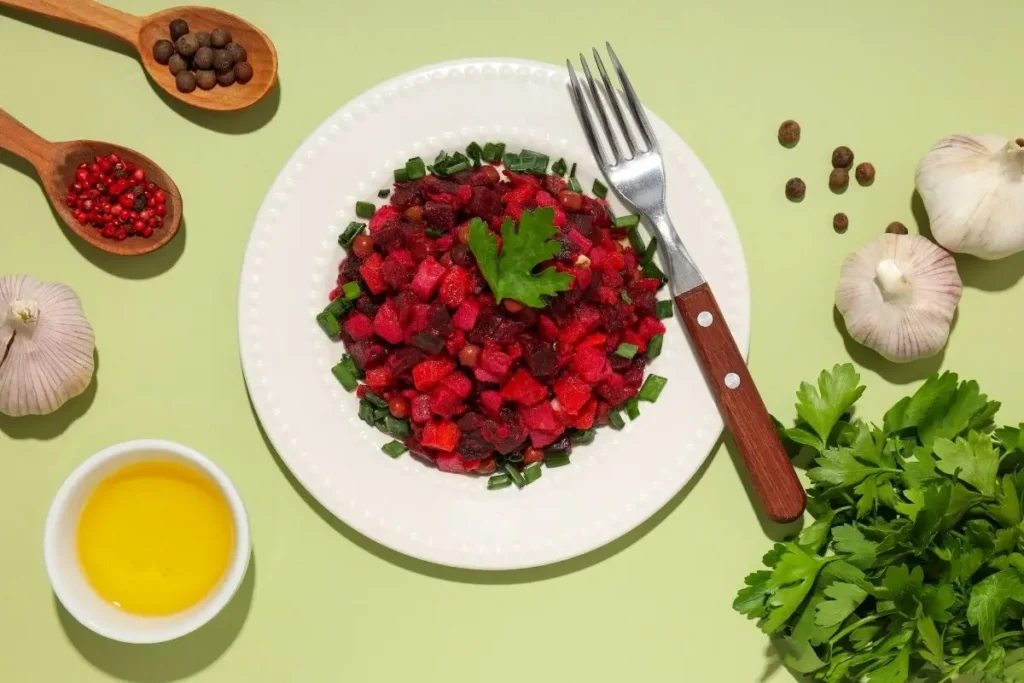
Next up is a salad as visually striking as it is healthful: Beet and Jicama Salad. It arrives as a vibrant mosaic – ruby-red beet cubes mingling with crisp white jicama sticks, all glistening in a citrus dressing. The sweet earthiness of roasted beets pairs perfectly with the cool crunch of jicama (a root vegetable often referred to as the “Mexican turnip”), creating a balance of flavors and textures that’s utterly refreshing.
This unique pairing also happens to be a nutritional powerhouse. Beets are famous for their blood-red pigment and for good reason: they’re rich in betalain antioxidants and nitrates that support cardiovascular health. Studies have shown that the nitrates in beets can help dilate blood vessels and lower blood pressure, reducing the risk of heart disease and stroke.
However, it’s important to note that about half of all strokes occur in people with normal cholesterol levels, so overall lifestyle and dietary choices remain crucial for prevention. Athletes sometimes drink beet juice to boost endurance, but even a humble beet salad can give your circulation a gentle nudge in the right direction.
On the other hand, jicama brings its own set of benefits. Jicama is high in dietary fiber (about 6 grams per cup) and mostly water, meaning it fills you up with very few calories. In particular, jicama contains a type of fiber called inulin, a prebiotic that feeds the beneficial bacteria in your gut for better digestion and even immune support. It’s also loaded with vitamin C – nearly half the daily value in one cup – so that tangy citrus dressing isn’t the only boost of immune-strengthening vitamin C in this bowl.
Together, the sweet beets and crunchy jicama create more than a flavor contrast; they form a nutritional tag-team. You’re getting heart-healthy nitrates and folate from the beets alongside gut-friendly fiber and antioxidants from the jicama. As you crunch through this salad, you can appreciate how East meets West on the plate – a little Lebanese inspiration with a Texan twist – delivering a truly healthy Mediterranean food in Houston.
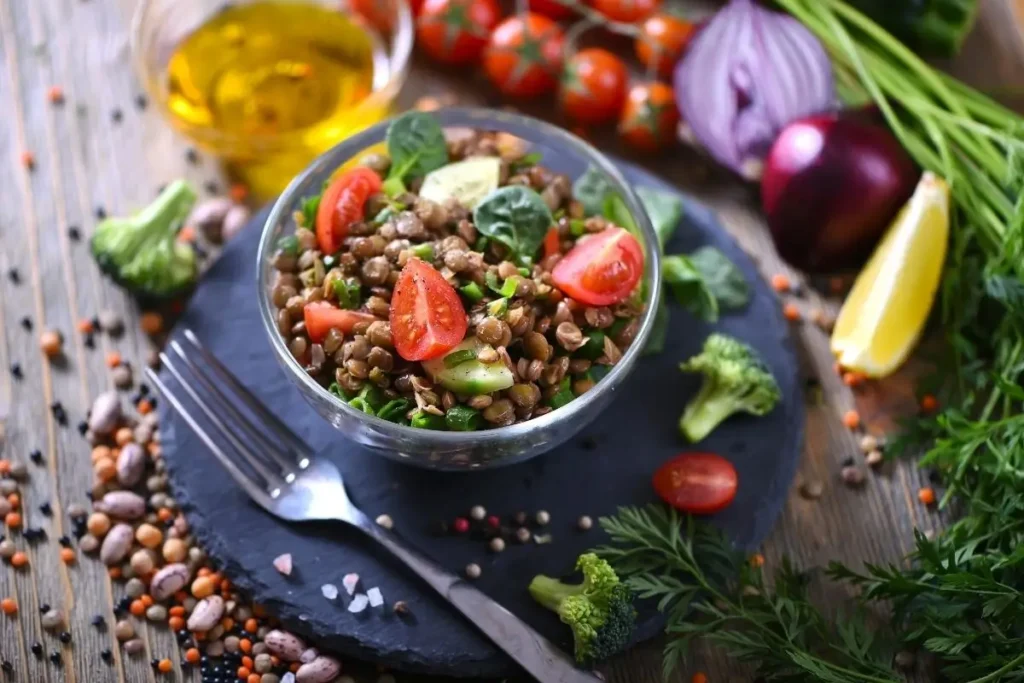
As the meal continues, a rustic Lentil Salad makes its appearance, embodying the hearty comfort of the Mediterranean. Lentils have been a beloved ingredient in Middle Eastern and South Asian cuisines for millennia – often enjoyed in soups like Lebanon’s shorbet adas, or mixed with rice and caramelized onions in mujaddara.
Here at Aladdin’s, the lentils take center stage in salad form: tender green-brown lentils are tossed with tomatoes, onions, cilantro or parsley, and a tangy herb vinaigrette. It’s a beautiful mosaic of earthy browns and vibrant greens and reds. One bite yields a satisfying, protein-rich texture with bright notes of lemon and olive oil. This is healthy eating at its finest – filling, flavorful, and highly nutritious.
Lentils are often touted as a vegetarian superfood, and it’s easy to see why. They are nutritional powerhouses, offering a generous amount of plant-based protein, cholesterol-lowering soluble fiber, iron, magnesium, and folate in each serving. Lentils carry about 18 grams of protein per cup when cooked, all while being naturally low in fat.
Lentils are also one of the many plant foods that form the foundation of the Mediterranean diet, alongside vegetables, fruits, herbs, nuts, beans, and whole grains. This means a lentil salad can provide the protein punch of a meat dish without the saturated fats. The benefits of these tiny legumes extend far beyond their macronutrient content: Regularly eating lentils has been linked to improved heart health, better blood sugar control, and even weight management. Their fiber helps stabilize blood glucose and keeps you full longer, which can aid in maintaining a healthy weight. Moreover, lentils are rich in folate and vitamin B6, essential B vitamins that support brain health and mood balance by aiding neurotransmitter production.
It’s no wonder that across cultures, lentils are considered both comfort food and medicine for the body. As you savor each bite of the lentil salad – the slight peppery kick of cilantro, the crunch of diced cucumber or bell pepper (if added), and the zing of vinegar – you’re also taking in a dose of wellness. Lentils help manage cholesterol and blood sugar levels while nourishing you with iron and B vitamins. This hearty salad stands out as proof that eating healthy doesn’t mean skimping on flavor or satisfaction. It’s a testament to how Mediterranean cuisine turns simple ingredients into dishes that are both fulfilling and fortifying.
Still looking for healthy Mediterranean food in Houston? Let’s keep the journey!
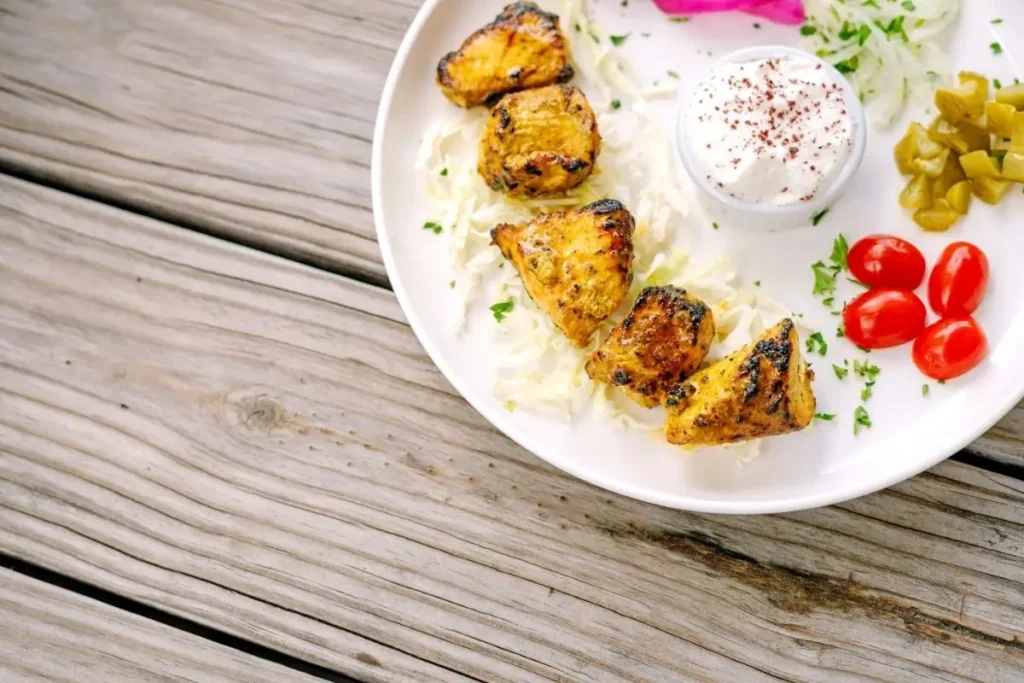
Our culinary tour wouldn’t be complete without a taste of Aladdin’s famous Saffron Chicken Kebab. Arriving on a platter, the kebab commands attention – chunks of chicken threaded on a skewer, grilled to perfection, and tinted a beautiful golden-yellow hue from the saffron marinade. The aroma is intoxicating: smoky char from the grill mingling with the floral, slightly sweet scent of saffron and spices. As you take a bite, the chicken is juicy and tender, with a depth of flavor that hints at garlic, lemon, and that unmistakable saffron warmth.
Saffron has long been one of the world’s most precious spices, known not just for its flavor and color but also for its potential health benefits. In this dish, saffron truly is the magic carpet that carries a simple chicken kebab to aromatic heights.
Beyond its culinary prestige, saffron is rich in antioxidants (such as crocin and safranal), which help neutralize free radicals in the body. These compounds have intriguing effects: research has linked saffron to improved mood and even relief of mild depressive symptoms. In traditional medicine, and increasingly in modern studies, saffron is noted for its mood-lifting properties – it’s sometimes nicknamed the “sunshine spice” for its bright color and its potential to brighten one’s mood.
Saffron may also have anti-inflammatory effects and has been studied for benefits ranging from relief of PMS symptoms to aiding in appetite control. While you’d likely need a concentrated supplement to see medicinal effects, the amount of saffron used to marinate these chicken kebabs still imparts those valuable carotenoids and antioxidants into each bite.
Let’s not forget the chicken itself: lean, high-quality protein that provides essential amino acids for muscle repair and immune support. Grilling the chicken allows excess fat to drip away, making this kebab a lighter option compared to fried foods. Grilling is a traditional Mediterranean cooking method that enhances both flavor and nutritional value, preserving the authentic taste and health benefits of the dish.
The result is a protein-rich entrée that keeps you satiated and energized without weighing you down. Enjoying a saffron chicken kebab means indulging in a dish that feels luxurious yet is fundamentally healthy – you’re getting the benefits of lean protein for strength, plus the unique perks of saffron while avoiding red meat. It’s a shining example of how Mediterranean cuisine utilizes herbs and spices not only to enhance flavor but also to promote overall well-being. As the golden skewer is polished off, you’re left with a lingering warmth, both from the spices and the knowledge that even an indulgent-tasting dish can be packed with goodness.
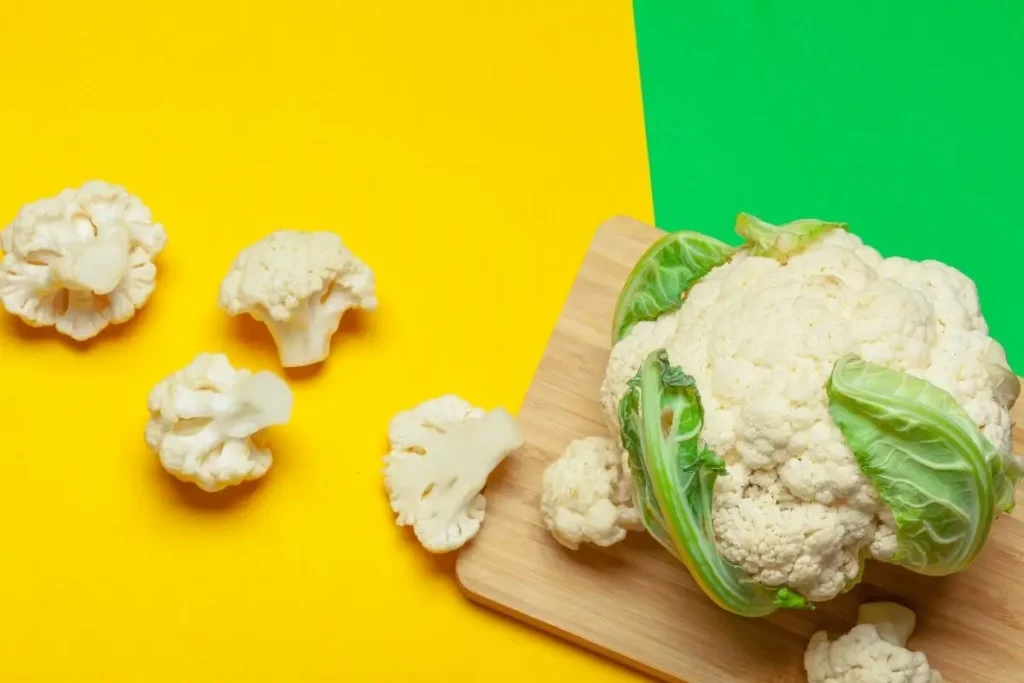
Who would have guessed that humble cauliflower could nearly steal the show? At Aladdin’s, Roasted Cauliflower is a sleeper hit – a side dish that many have turned into a personal favorite. The cauliflower florets arrive at the table perfectly roasted to a golden brown. They’re slightly crispy on the edges, yet tender inside, and tossed with a light touch of olive oil, lemon, and perhaps a sprinkle of cumin or fresh herbs.
The first bite yields a nutty, rich flavor with a subtle sweetness, utterly satisfying in a way that raw cauliflower could never be. It’s comfort food, Mediterranean style – wholesome vegetables elevated to delicious heights. Roasted cauliflower is also one of the Mediterranean staples that make healthy eating both delicious and accessible.
Cauliflower is a cruciferous vegetable (in the same family as broccoli, kale, and cabbage) and is often touted as a nutritional powerhouse, especially when it comes to vitamins and cancer-fighting compounds. When you enjoy it roasted, you’re still getting all those benefits. Cauliflower is high in vitamin C, packing about 77% of the daily recommended intake in one medium head, which supports your immune system and skin health. It’s also a good source of vitamin K, B vitamins, fiber, and potassium.
Perhaps even more interesting are cauliflower’s antioxidants: it contains glucosinolates and sulforaphane precursors – compounds that research suggests can help reduce inflammation and protect against oxidative stress in our cells. Roasted cauliflower doesn’t just taste good; it can actively contribute to reducing inflammation in the body, which is a root factor in many chronic diseases.
One analysis of its nutritional profile might even call cauliflower “brain food.” The reason? Cauliflower is a surprisingly good source of choline, a nutrient essential for brain development and nerve function, which many people don’t get enough of in their diets. By roasting cauliflower, you concentrate its flavors and make it more palatable, which encourages larger servings – and thus more intake of those beneficial nutrients – than you might eat if it were raw or steamed.
As you relish this dish, perhaps scooping up florets with a bit of tahini sauce or just on their own, you’re partaking in a Lebanese tradition of making vegetables truly crave-worthy. It’s easy to forget that this savory, almost indulgent side is entirely plant-based and packed with fiber while being low in calories. But your body will remember: the fiber aids digestion and feeds a healthy gut, and the range of whole foods and antioxidants contributes to everything from improved heart health to a sharper mind.
When simple cauliflower is treated with care and expertise, it transforms into a dish that comforts you from the inside out – sophistication in simplicity, as the menu describes it, and a reminder that nutritious food can be deeply satisfying.
Finally, we conclude our feast with a dish that is a testament to the culinary creativity of Mediterranean cuisine: the Pomegranate Eggplant Stew. This stew, known on the menu as Eggplant Pomegranate Stew, arrives in a warm bowl, its aroma wafting upward with notes of tangy sweetness and roasted vegetables. The stew’s base is a delicate tomato broth enriched by pomegranate molasses – a reduction of pomegranate juice that lends a unique sweet-sour flavor – and it’s studded with tender chunks of eggplant and hearty chickpeas.
The first spoonful is a revelation: the eggplant nearly melts in your mouth, having absorbed the sauce’s complex flavors, and the pomegranate adds a gentle zing that dances on your tongue. There’s a hint of spices, such as cumin or pepper, and the overall experience is one of comfort with an exotic twist. This vegan, gluten-free stew exemplifies how Mediterranean and Middle Eastern cooking can coax immense flavor from simple ingredients. Dishes like this are inspired by the diverse culinary traditions of the Mediterranean region, where centuries of cultural exchange have given rise to a rich and flavorful cuisine. And fittingly, it’s also brimming with health benefits.
The eggplant in this stew is not only there for its creamy texture and ability to soak up flavors; it’s also a nutritious addition. Eggplants are rich in fiber and low in calories, making them an excellent choice for promoting digestive health and maintaining a healthy weight. But their real nutritional star is the deep purple skin – that rich hue comes from anthocyanins, a class of antioxidants.
In particular, eggplants contain an anthocyanin called nasunin, which research has shown can protect cells (especially brain cells) from oxidative damage. Anthocyanins are also known to support heart health, as they reduce inflammation and potentially improve blood flow. So as you enjoy those soft eggplant pieces, you’re also taking in compounds that act as a shield for your body’s cells against aging and stress.
Now consider the pomegranate element: pomegranate is often called a superfood, revered in ancient cultures and modern science alike for its dense antioxidant content. Pomegranate molasses infuses the stew with those very antioxidants, notably polyphenols like punicalagins, which give pomegranate juice three times the antioxidant activity of red wine or green tea.
These antioxidants help quell inflammation and have been linked to various heart health benefits, including lowering blood pressure and improving cholesterol profiles. In essence, the pomegranate in the stew is a heart-healthy touch, potentially helping to keep arteries flexible and clear.
Let’s not forget the chickpeas dotting the stew, adding protein and extra fiber. Chickpeas (also known as garbanzo beans) are another staple of the Mediterranean diet, contributing to satiety, blood sugar stability, and a healthy intake of plant-based protein. They contain iron, B vitamins, and magnesium, which support energy and metabolism. Together, the trio of eggplant, pomegranate, and chickpeas makes this stew a nutritional powerhouse wrapped in a cozy, flavorful package.
Each spoonful offers a harmonious blend of fiber, antioxidants, vitamins, and protein. As you savor this stew, perhaps with a side of fluffy saffron rice or a piece of warm pita, there’s a contentment that washes over you. It’s the kind of dish that not only fills your belly on a cool evening but also leaves you feeling nourished and cared for. In the story of our meal, this stew is the gentle, reassuring finale – a sweet and tangy send-off that lingers in memory.
As our Mediterranean feast in Houston comes to an end, one thing is abundantly clear: healthy food and delicious food are not opposites – they are perfect partners on the plate. Each dish we explored – the tabouli salad, beet and jicama salad, lentil salad, saffron chicken kebab, roasted cauliflower, and pomegranate eggplant stew – is a chapter in a story that connects traditional wisdom with modern wellness.
Through creative storytelling on the menu, Aladdin’s has demonstrated how a restaurant can serve as a bridge between cultures and an ambassador of the renowned Mediterranean diet right here in Texas. By using fresh vegetables, fruits, lean proteins, whole grains, and precious spices, this Mediterranean restaurant in Houston offers more than just a meal; it offers a lifestyle of eating that nourishes both the body and the soul.
The Mediterranean diet is widely recognized as a healthy eating pattern rooted in the traditional eating habits and food preferences of the Mediterranean region, particularly in Southern Italy. It emphasizes whole foods and locally sourced foods, with a Mediterranean diet food list that features dairy products like yogurt and cheese, as well as fresh fruit as daily staples.
To follow the Mediterranean diet, focus on balanced meals built around these core foods and sustainable lifestyle choices. A dietitian can help tailor the Mediterranean Diet to meet individual needs, taking into account medical history and dietary preferences. This approach helps reduce risk factors for cardiovascular diseases, high cholesterol, and Alzheimer’s disease, supporting long-term health and well-being.
The next time you find yourself seeking for healthy Mediterranean food in Houston, remember that you don’t have to sacrifice flavor for health. Whether you’re biting into parsley-bright tabbouleh that uplifts with antioxidants and fiber, or relishing a stew rich in vitamins and tangy goodness, you are treating yourself to food that loves you back. The Mediterranean way of eating has long been celebrated for its health benefits – from heart health to longevity – and after this journey, it’s easy to see why. It’s a cuisine where every ingredient has a purpose: olive oil to protect the heart, herbs to heal and delight, pulses and veggies to strengthen and satisfy, spices to invigorate and comfort.
In Houston’s vibrant culinary scene, Aladdin Mediterranean cuisine stands out as a beacon of this philosophy. Each dish carries the heritage of Lebanon and the broader Middle East, yet speaks directly to the health-conscious diners of today. As you leave the table, happily full and energized, you carry with you more than just the pleasant memory of spices and textures – you carry the benefits of what you’ve eaten: perhaps a bit more vigor in your step from the iron and protein, a calmer mind from the omega-3s and B vitamins, a heart a touch more at ease from the antioxidants and fiber. Mediterranean magic isn’t just in the taste; it’s in how it makes you feel afterward.
So here’s to the journey of discovering healthy, flavorful dishes in the most inviting of places. May your future meals be as rich in story as they are in nutrients. And when in Houston, you now know where you can find a little taste of the Mediterranean that feeds your hunger and your health in equal measure. Sahtein – to your health – and happy dining!
You might like it